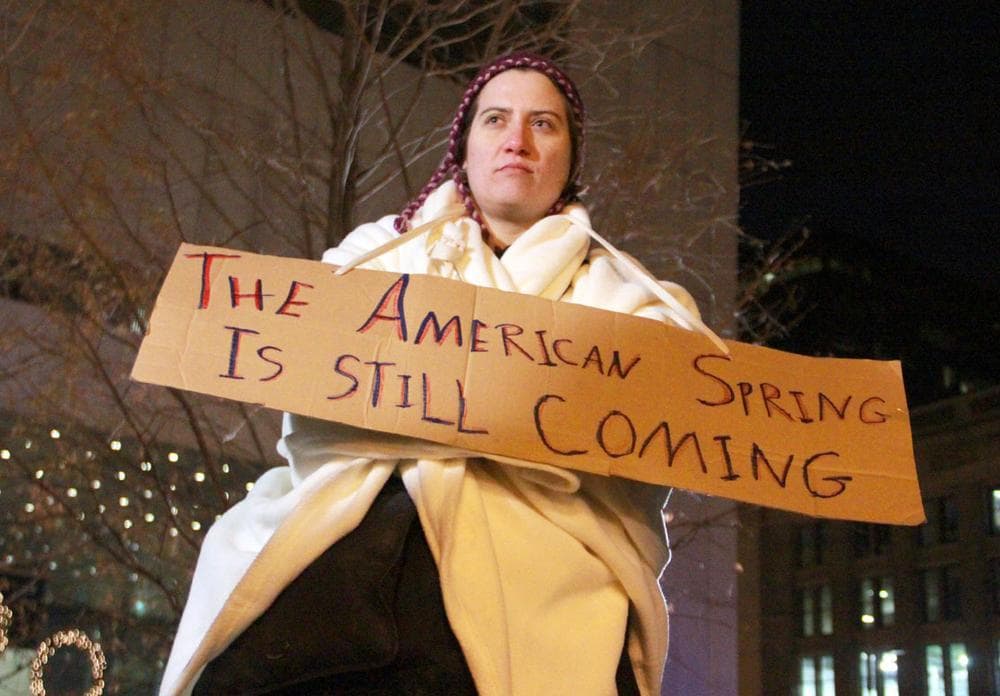Advertisement
Without A Camp, Occupy Boston Seeks Next Phase
Resume
The Occupy Boston movement plans to join a rally on Causeway Street Monday afternoon against federal housing policies. More than a week after the dismantling of the Dewey Square encampment, opinions vary on the effectiveness of the movement.
Even before police swept through the encampment, demonstrator Noah McKenna predicted that the dismantling of the camp wouldn’t be the movement's end.
"The Occupy movement is very resilient and we are not only going to keep existing when this camp is destroyed, and many protestors arrested, we are going to be strengthened," McKenna said.
Tim McCarthy, an expert on social movements at Harvard’s Kennedy School of Government, says he also doesn't think it's over. "I think this is the twilight of the first act," McCarthy said.
"The next part is to say: what are some of the solutions, and how do we garner support for those solutions?"
Barry Bluestone, Northeastern University professor
A lot of people watching this movement give it credit for changing the national conversation about social inequality.
"Everywhere I go, no matter where I am or who I’m talking to or what I’m doing, the Occupy movement is on everybody’s mind," McCarthy said. "It’s been a complete game-changer for the conversation."
Even President Obama called economic fairness and balance “the defining issue of our time” in a recent speech on the economy. Finally, people are talking about what she’s spent years teaching, says Boston University sociology professor Susan Lee.
"I think it’s been very effective in bringing out the fact that this top 1 percent has really benefited enormously from changes in the economy over the last 20 to 30 years and the bottom 99 percent has barely hung on," Lee said.
Observers say the tent encampments were just the beginning and the movement will have to enter another phase of organizing if it’s to accomplish policy changes. Some demonstrators say the movement will become floating — occupying warehouses, banks, closed schools and foreclosed properties, which Occupy groups around the country have already done.
Northeastern University professor of political economy Barry Bluestone believes the next phase for the movement will also be teach-ins. He helped organize Northeastern’s seven-hour-long series of lectures that attracted 800 people.
"What the Occupy Wall Street did was call attention to the issue, that’s the first part of a real movement," Bluestone said. "The next part is to say: what are some of the solutions, and how do we garner support for those solutions? That’s what the teach-in tried to do."
He says teach-ins were key to spreading the Vietnam protest movement among young people. But a new nationwide poll shows young people don’t care about the Occupy movement. The poll, done by the Institute of Politics at Harvard, says less than one in four Millennials (people ages 18-29) support the movement. One third don’t at all.
"Half weren’t paying attention, so maybe if they were paying attention they’d participate," said Trey Greyson, who directs the Institute of Politics. "The second thing is it’s relatively new, it only started a couple months ago, it primarily has been in urban areas, not in suburban or rural areas."
And there’s a high degree of skepticism that the movement will accomplish anything. Will the demonstrations help change U.S. economic policy? Thirty-eight percent of young people polled say no.
Paul McMorrow, of the independent think tank MassINC, shares that skepticism because the movement has no platform.
"I don’t think it’s a complete movement if you are only critiquing without advancing some alternative," McMorrow said. "I don’t think you’re participating fully in the process."
But historians say other social movements have started without a list of unified demands or clear leaders. McCarthy says they have a horizontal structure and they ebb and flow.
"Past movements have had lots of different iterations," he said. "The abolitionist movement had thousands of different auxiliary anti-slavery societies. The civil right's movement was a series of different kinds of campaigns in different locations throughout the South."
McCarthy says social movements can take years to build and the Occupy movement, if it continues, is in its infancy.
Earlier Coverage:
This program aired on December 19, 2011.